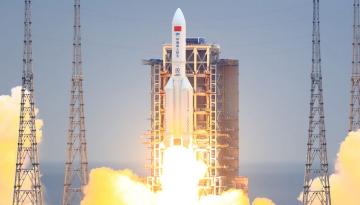NASA is launching two new US$500 million missions to Venus - the first to go to the planet in over 30 years.
The space agency on Thursday announced two missions, DAVINCI+ and VERITAS, which will head to the planet as part of its Discovery programme.
"The missions aim to understand how Venus became an inferno-like world when it has so many other characteristics similar to ours - and may have been the first habitable world in the solar system, complete with an ocean and Earth-like climate," NASA said in a statement.
Each mission is expected to launch between 2028-2030.
DAVINCI+ will measure the composition of Venus' atmosphere to understand how it formed and evolved. It will also work to determine if the planet has ever had an ocean.
The mission is also expected to bring back the first high-resolution images of 'tesserae' - a unique geological feature that suggests the planet has tectonic plates.
"This would be the first US-led mission to Venus' atmosphere since 1978, and the results from DAVINCI+ could reshape our understanding of terrestrial planet formation in our solar system and beyond," NASA said.
The VERITAS mission will map Venus' surface to provide information regarding the planet's geologic history and why it has developed in a different way to Earth.
"Orbiting Venus with a synthetic aperture radar, VERITAS will chart surface elevations over nearly the entire planet to create 3D reconstructions of topography and confirm whether processes such as plate tectonics and volcanism are still active on Venus."
Thomas Zurbuchen, NASA's associate administrator for science, said in a statement the agency is "revving up" to intensely explore Venus.
"Using cutting-edge technologies that NASA has developed and refined over many years of missions and technology programs, we're ushering in a new decade of Venus to understand how an Earth-like planet can become a hothouse. Our goals are profound. It is not just understanding the evolution of planets and habitability in our own solar system, but extending beyond these boundaries to exoplanets, an exciting and emerging area of research for NASA."
Zurbuchen said he anticipates the data collected from the missions will be significantly beneficial to the scientific community.
Discovery Program scientist Tom Wagner agreed.
"It is astounding how little we know about Venus, but the combined results of these missions will tell us about the planet from the clouds in its sky through the volcanoes on its surface all the way down to its very core. It will be as if we have rediscovered the planet."


